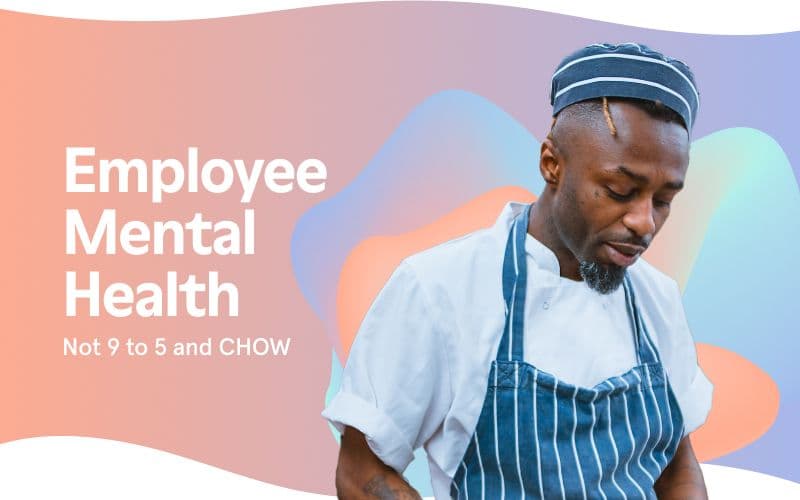By Hassel Aviles, Executive Director of Not 9 to 5 and Jasmin Parks-Papadopoulus, Head of Community at CHOW.
Mental health is not about feeling great or calm or being in a good mood. It is about having feelings that fit the circumstances we’re in and managing our emotional experiences, even if those feelings are negative, difficult or unpleasant. Everyone has mental health, just like everyone has physical health. Your mental health can fluctuate over years, months, and days.
While work isn’t the only factor that affects someone’s mental health, it has a huge influence on it. An employee’s mental health is affected by their manager more than their doctor or therapist. It’s up to employers to create foundations and policies that foster good mental health for their teams. It’s up to the employee to look after themselves and know when to ask for help.
The state of mental health challenges in hospitality
It’s undeniable — working in a restaurant is stressful. From being on your feet all day to working around hot grills, restaurant shifts are tough. Many restaurant workers are in precarious situations, often earning minimum wage and living paycheck to paycheck. 10% of all restaurant employees in the U.S. are undocumented.
Aside from the human reason to look out for your team, there’s a business cost to poor morale and mental health. Mental health issues are associated with burnout, absenteeism, and turnover. Many restaurants achieve only low, single-digit profit margins due to labor challenges.
The missing ingredient in the success of the future of restaurants is prioritizing workplace mental health and psychological safety.
Why? Because it helps protect and unlock the potential of the biggest asset of the restaurant industry: the people. We are not in the business of culinary products and beverages; we are in the business of people who happen to serve food and drinks.

Restaurant Employee Mental Health Resource List
Post in your kitchen or staff room for your team to access.
The already-high rates of mental health and substance use challenges before the pandemic are increasing. Not 9 to 5 conducted a survey in 2021 throughout North America involving over 630 hospitality and culinary professionals.
Respondents reported experiencing symptoms of mental illness, including:
- burnout (87%)
- anxiety (84%)
- depression (77%)
- disordered eating (63%)
This is compounded by oppression and inequity that affects us industry-wide. It is our responsibility as industry leaders to create diverse, inclusive, equitable, and accessible spaces that offer psychological safety for all. When folks feel psychologically safe, they can show up as they are, make mistakes, be vulnerable, share feedback and take risks without fear of negative consequences.
Psychological safety at work
Our identities are made up of many factors and each of us have different forms of privilege. We need to acknowledge and consider those when making strategic decisions for the workplace.
Leaders in the workplace need to educate themselves about intersectionality, non-judgmental communication, and how to foster psychological safety in the workplace. It starts with leaders who have the most power and privilege in the organization and trickles down from there.
So how can leaders get started? The four stages of psychological safety demonstrate that leaders can transform workplaces and teams, as studied by Timothy R. Clark.
This happens when individuals feel:
- included
- it’s safe to learn
- safe to contribute and,
- safe to challenge the status quo.
Restaurant leaders can learn how to foster inclusion and psychological safety by listening to their teams and ensuring they feel all four stages. By centering the voices of those most affected and including input from all levels, leaders can then make informed decisions and innovate the workplace. When community care and leadership accountability exist, systemic change is possible.
The importance of open communication
Prioritizing mental health and wellness in the food/beverage/hospitality industry starts with open, honest and vulnerable lines of communication. We all have mental health, just like physical health, and encouraging conversations around these topics eliminates the stigma around them. By acknowledging that everyone clocks in and out of work with mental health and complex human emotions, we recognize that the old mentality of “checking your stuff at the door” creates unhealthy coping mechanisms in our industry.
The industry used to thrive on a hierarchical structure that discouraged communication around sensitive topics and linear decision-making. When we start to have equal-input conversations and healthy exchanges of opinions with assertive communication, we begin to transform the old model. Through open communication, we can increase the exchange of specific resources, share our stories to encourage support, and create authentic connections in the workplace. These channels of communication can be opened with conversation models or scripts so that they are less intimidating and more guided.
Organizations like CHOW are working diligently to develop concrete conversation scripts that folks can utilize to best support their staff. Information on how to approach difficult conversations can be found on Not 9 to 5’s website and in CHOW’s Workplace Toolkits.
How to prioritize worker wellness
A great first step to prioritizing wellness and mental health is for leaders to model healthful behavior to our coworkers and employees. By encouraging breaks, rest, wellness initiatives and healthy boundaries, and partaking in these behaviors ourselves, we create an environment that supports people who take care of themselves.
We can bolster this behavior with consistent conversations around these topics. By asking open-ended questions that encourage folks to share their experience, we create spaces for de-stigmatizing conversations. We can begin to extend support to each other by relating on a human level, putting hierarchy aside. The model of peer to peer support also serves to relieve pressure from owners/operators who often feel like they are solely responsible for the mental health of their employees.
To expand this industry-wide, we can begin to share resources and stories with other restaurants and businesses like town hall models. These can be created at the owner’s or operator’s discretion by implementing the same conversation models mentioned earlier for staff. With the understanding that trust, assertiveness, and sharing resources can create a healthier workplace, restaurant owners and operators can enlist external support of professionals who face similar challenges and successes. For example, discussing the advantages of substituting shift drinks with wellness activities or gift cards can create larger systemic changes beyond one workplace.
Invest in education, training and proactive programs that promote positive mental health in addition to treatment. That goes beyond reacting to something that has already happened. Part of creating psychologically safe environments as an employer is to be aware of and prepared to address difficult questions. Sometimes the answer is “I don’t have an answer to that yet, but I will explore options and reach out as soon as I do.”
Not 9 to 5 worked with 7shifts to create a Mental Health for Restaurants course targeted to restaurant managers and operators. Sign up now to learn about topics like burnout vs. stress, substance use, equity and inclusion, and how leaders can support their teams.
Create a healthy workplace for everyone.
For years, clocking in at work meant clocking out of being seen as a full scope human being – one that may experience mental health struggles or complex emotions. That line of thinking encouraged food and beverage workers to ignore their human experience and focus on the hospitality they were offering patrons while at work. This idea, along with many others, discouraged self care and kept important conversations about mental health at bay.
We want to accept that workers have different abilities, tolerances, and preferences, and we want to encourage workers to show up as they are. In encouraging workers to show up authentically, we invest in them as human beings long term. These long-term investments allow workers to build systems of support that keep them healthy and happy in the industry.
Hospitality is not just reserved for a guest; it must also flow inwards. Education on psychological safety and workplace mental health guides us to be hospitable to our internal customers and teams as well. Taking care of teams is taking care of the restaurant business; they are one and the same. Investing in employee mental health is how the hospitality industry and restaurants thrive and succeed.
About the Authors
CHOW’s mission is to support wellness within the hospitality industry and to improve the lives of our community through shared stories, skills, and resources. Providing individual support through peer to peer discussion groups as well as developing programming to create a more healthful food/beverage/hospitality industry. To find vocationally specific resources and download our free Workplace Wellness Toolkit, head to www.chowco.org.
Not 9 to 5 is a non-profit global leader in mental health advocacy for the foodservice and hospitality sector, reimagining the industry by breaking stigmas and fuelling hope through practical education and meaningful community-building.
Not 9 to 5 created the CNECTing platform for hospitality professionals to access workplace mental health educational training. Join for free to access industry-specific resources including the groundbreaking certification course called CNECTed and Not 9 to 5 workplace mental health guidebook.

Hassel Aviles, Author
Hassel Aviles
Author
Hassel Aviles has built a career in the hospitality and foodservice industry. She was inspired to co-found Not 9 to 5, a non-profit that empowers foodservice service workers like herself.
